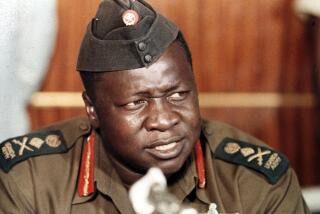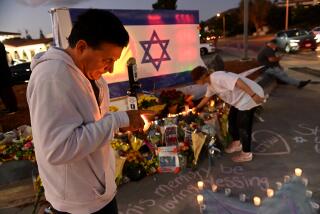In Egypt, activist’s death is new blow to revolution
CAIRO — To many of those who took part in Egypt’s 2011 uprising against Hosni Mubarak, the death of Bassem Mohsen epitomizes the revolution’s dashed hopes.
Mohsen, 25, was shot in the head last week during an antigovernment protest in his native city of Suez. On Sunday, his death was confirmed. On Monday, friends and family gathered outside the hospital where his body lay, waiting for official permission for an autopsy.
The young activist was a veteran of protests against not only Mubarak, but also the military administration that followed, the Islamist rule of Mohamed Morsi and the current authoritarian-minded interim government. He persisted despite losing sight in one eye in a demonstration in 2011 — at one point, police snipers were told to target protesters’ eyes — and later being sentenced to jail by a military tribunal.
“The story of a revolution … the end of the story,” said a message posted on a Facebook page memorializing Mohsen. “Bassem died exactly like the dream of having a better country is dying,” read another post.
Days later, it was still unclear whether Mohsen had been shot by security forces or fellow protesters. But he was mourned as part of the cohort of 2011 revolutionaries who have fallen on hard times.
Three well-known activists of the uprising against Mubarak received three-year jail sentences Sunday for violating a tough new anti-protest law. Last week, the Cairo office of a prominent rights group was raided and some of its workers roughed up and arrested, though all but one were later released. And the case of about two dozen other secular activists, also arrested for unauthorized protests, has been referred to criminal court.
Many of the 2011 activists have expressed the view that elements of the current government, in particular the police, are actively seeking vengeance against them. Hints of score-settling also have emerged in a separate case, that of a group of prominent reformist judges now under scrutiny by Egyptian authorities.
Half a dozen leading members of the group, called Judges for Egypt, have been summoned before an investigative judge looking into allegations that they formed an illegal organization, the state-owned Ahram website reported Monday.
The group, which advocates judicial independence, probably incurred the interim government’s wrath by announcing a boycott of a mid-January referendum on the country’s newly rewritten constitution. Egyptian authorities see that nationwide poll as an opportunity to bolster the government’s legitimacy both inside and outside Egypt.
The group of jurists also took part in monitoring the 2012 presidential voting that swept Morsi to power — and irritated the military-backed administration at the time by providing early word that the Islamist candidate had won the polling. The move against the group now could be a warning to referendum monitors not to try to preempt the official count.
The weeks leading up to the Jan. 14-15 referendum could also bring an intensification of the army’s campaign against militants in the Sinai Peninsula, after a failed raid last week that left two soldiers dead. Troops were trying to capture what the military described as important terrorism suspects in the group Ansar Bayt al Maqdis, or Partisans of Jerusalem.
The group posted a warning on militant websites Monday aimed at Egypt’s armed forces, demanding that conscripts quit the police and army or prepare to face death as “infidels,” according to the Associated Press. During fighting Friday, militants managed to seize the corpse of one of the slain soldiers, and paraded and displayed it in a nearby village, the AP reported, citing witnesses and tribal leaders.
Hassan is a special correspondent.
More to Read
Start your day right
Sign up for Essential California for news, features and recommendations from the L.A. Times and beyond in your inbox six days a week.
You may occasionally receive promotional content from the Los Angeles Times.






